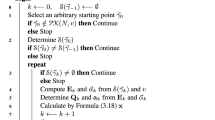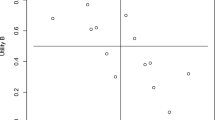Abstract
This paper surveys non-cooperative implementations of the core which tell an intuitive story of coalition formation. Under the core solution concept, if a blocking coalition exists those agents abandon the current allocation without regard for the consequences to players outside the blocking coalition. Yet in certain circumstances, these players have an incentive to prevent formation of any blocking coalition; a game analyzed in Lagunoff (Games Econ Behav 7:54–61, 1994) is vulnerable to such circumstances. To obtain all core allocations and only core allocations, a mechanism must either restrict the actions of non-members of a proposed coalition, or ensure that non-members are unharmed by the departure of the coalition. These requirements illustrate the core’s nonchalance toward agents not in blocking coalitions.
Similar content being viewed by others
References
Abreu D, Sen A (1990) Subgame perfect implementation: a necessary and almost sufficient condition. J Econ Theory 50: 285–299
Anderson R (1992) The core in perfectly competitive economies. In: Aumann R, Hart S (eds) Handbook of game theory with economic applications. North-Holland, Amsterdam, pp 413–457
Aumann R, Maschler M (1964) The bargaining set for cooperative games. In: Dresher M, Shapley LS, Tucker AW (eds) Advances in game theory. Princeton University Press, Princeton, pp 443–476
Bergin J, Duggan J (1999) An implementation-theoretic approach to non-cooperative foundations. J Econ Theory 86: 50–76
Bloch F (1996) Sequential formation of coalitions in games with externalities and fixed payoff division. Games Econ Behav 14: 90–123
Chander P (2007) The gamma-core and coalition formation. Int J Game Theory 35: 539–556
Chatterjee K, Dutta B, Ray D, Sengupta K (1993) Theory of coalitional bargaining. Rev Econ Stud 60: 463–477
Dutta B, Ray D, Sengupta K, Vohra R (1989) A consistent bargaining set. J Econ Theory 49: 93–112
Edgeworth FY (1881) Mathematical psychics. Kegan Paul, London
Evans R (1997) Coalitional bargaining with competition to make offers. Games Econ Behav 19: 211–220
Greenberg J (1990) The theory of social situations: an alternative game-theoretic approach. Cambridge University Press, Cambridge
Horniaček M (2007) Negotiation, preferences over agreements, and the core. Int J Game Theory 37(1): 235–249
Kalai E, Postlewaite E, Roberts J (1979) A group incentive compatible mechanism yielding core allocations. J Econ Theory 20: 13–22
Kolpin V (1989) Core implementation via dynamic game forms. Soc Choice Welf 6: 205–225
Lagunoff R (1994) A simple noncooperative core story. Games Econ Behav 7: 54–61
Mas-Colell A (1989) An equivalence theorem for a bargaining set. J Math Econ 18: 129–139
Maskin E (1977) Nash equilibrium and welfare optimality. Mimeo, Massachusetts Institute of Technology
Maskin E (1985) The theory of implementation in Nash equilibrium: a survey. In: Hurwicz L, Schmeidler D, Sonnenschein H (eds) Social goals and organization: essays in memory of Elisha Pazner. Cambridge University Press, Cambridge, pp 173–204
Moldovanu B, Winter E (1994) Core implementation and increasing returns to scale for cooperation. J Math Econ 23: 533–548
Moore J, Repullo R (1988) Subgame perfect implementation. Econometrica 56: 1191–1220
Okada A (1992) Noncooperative bargaining and the core of an N-person characteristic function game. Control Cybern 21: 231–250
Okada A, Winter E (2002) A non-cooperative axiomization of the core. Theory Decis 53: 1–28
Pérez-Castrillo D (1994) Cooperative outcomes through noncooperative games. Games Econ Behav 7: 428–440
Perry M, Reny P (1994) A noncooperative view of coalition formation and the core. Econometrica 62: 795–817
Reny P (1997) Two lectures on implementation under complete information: general results and the core. In: Hart S, Mas-Colell A (eds) Cooperation: game-theoretic approaches. Springer, Berlin, pp 91–113
Serrano R (1995) A market to implement the core. J Econ Theory 67: 285–294
Serrano R (1997) A comment on the Nash program and the theory of implementation. Econ Lett 55: 203–208
Serrano R, Vohra R (1997) Non-cooperative implementation of the core. Soc Choice Welf 14: 513–525
Serrano R, Vohra R (2002) Bargaining and bargaining sets. Games Econ Behav 39: 292–308
Yan H (2002) Non-cooperative selection of the core. Int J Game Theory 31: 527–540
Yi S (1997) Stable coalition structures with externalities. Games Econ Behav 20: 201–237
Author information
Authors and Affiliations
Corresponding author
Additional information
The author gives special thanks to Beth Allen and Andy McLennan for their direction, and gratefully acknowledges valuable discussions with Roger Lagunoff, Hugo Sonnenschein, John Ledyard, Myrna Wooders, Nuray Akin, as well as comments from participants at the 2004 Spring Midwest Economic Theory and the Society for Economic Design conferences and from anonymous referees. All errors remain my own. Partial funding came from National Science Foundation grants DMI-0070257 and DMI-0217974.
Rights and permissions
About this article
Cite this article
Platt, B.C. Spoilers, blocking coalitions, and the core. Soc Choice Welf 33, 361–381 (2009). https://doi.org/10.1007/s00355-008-0363-3
Received:
Accepted:
Published:
Issue Date:
DOI: https://doi.org/10.1007/s00355-008-0363-3




